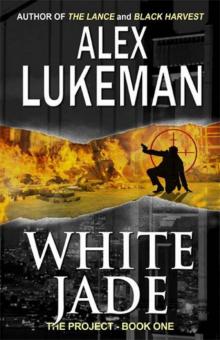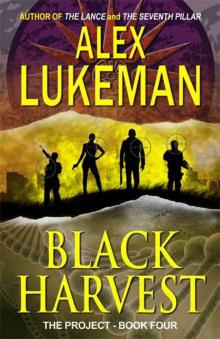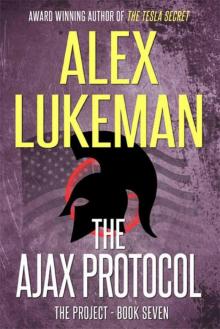- Home
- Lukeman, Alex
White Jade (The PROJECT) Page 23
White Jade (The PROJECT) Read online
Page 23
Selena brushed a stray wisp of hair from her forehead.
Harker said, "Shin Bet is Israel's version of the FBI, on steroids. They handle internal security and counter-terrorism. Mossad is foreign intelligence and ops, like MI6 or CIA."
Carter looked down at his hands and picked at a broken fingernail. "Lodge is a devious bastard and a narcissist."
"Whatever he is, he's not going to brush us off. You're going to Israel. You find something that threatens Rice's security, give it to Shin Bet and the Secret Service. They've got the manpower, let them handle it. You leave today."
"I always wanted to see Jerusalem. Maybe I'll get a little sightseeing in."
She set the pen down and folded her hands. "It's not a vacation, Nick. You're booked into the same hotel as the President as part of his party, right outside the Old City. The Israelis may not let you keep your weapon. They're sensitive about guns and you're not Secret Service."
"Who's the source over there?"
"His name is Arshak Arslanian. He has a shop in the Armenian Quarter." She slid the manila folder across her desk. "His photo and info is in there."
Harker turned to Selena. "Selena, you continue with Ronnie this afternoon."
Ronnie was the third member of Nick's team. He was just back from visiting his family on the Navajo Reservation in Arizona. He'd been coaching Selena. Physical training, weapons, codes, the tricks of personal survival. All the things that might give her a chance to make it through the next year.
Harker tapped her pen and looked at Nick. "You'll need a lot of time to clear security. You'd better get going."
CHAPTER TWO
The sweet scent of Jasmine vines wafted through the open window of a crumbling tenement in the Old City of Damascus. A man bent over a wooden table with a soldering iron. He wiped sweat away from his forehead with the frayed sleeve of his shirt and concentrated on his task.
Another man watched from a sagging couch pushed against one of the stained yellow walls. He wore a dark suit of European cut. His crisp, white shirt was open at the collar.
The man on the couch had a face that was blank, forgettable. His features were smooth and calm, as if life had never quite reached the surface. It was hot in the apartment, but the man was not sweating. His eyebrows were unnoticeable above his colorless eyes. His nose seemed to disappear into the vagueness of his features. His lips were a thin, invisible line.
The man at the table was called Ibrahim. The man on the couch was called the Visitor, but Ibrahim didn't know that. It was better that way.
The bomb was almost finished. It was a very fine bomb, perhaps the best Ibrahim had ever made, and he had made many. He was well known throughout the terrorist network. If you wanted something unusual, reliable and easily concealed, with the most destructive result, you sought out the Syrian.
Anyone with a simple knowledge of electronics could build a suicide vest or a roadside device, but few could do what Ibrahim did. The truth of his skill was easy to see. He still owned almost all of his fingers and both eyes, no mean feat for an old bomb maker.
He soldered the final connection. He set the iron down and allowed himself to relax.
"It is ready?"
The man in the suit spoke in Arabic, his voice quiet, pleasant. He got off the couch, looked over the bomb maker's shoulder. Ibrahim tried to place the accent. German, perhaps.
Ibrahim took an unfiltered cigarette from a crumpled yellow pack, held it in nicotine stained fingers and lit it. The harsh tobacco smoke formed a blue cloud as he exhaled. The man in the suit concealed his disapproval.
"Yes, ready. When you place the charge, set and activate the timer. There is a twenty-four hour window."
Ibrahim showed his guest the arming device, small like a woman's wrist watch. A red arrow was etched on the bezel surrounding the dial. The face was marked for twenty four hours. A second, smaller ring within the first was divided into twelve five minute increments.
"Set the hour by rotating the outer ring clockwise. Then, set the inner ring counter clockwise for fine adjustment. You can reset until you press this button. After that, no. The timer will run until your mark is reached. The bomb is safe until the time chosen. Then, boom."
The Visitor nodded.
"Give me the pack."
The Visitor handed Ibrahim a backpack. Bright yellow letters over a yellow and green ram's head imprint spelled out Colorado State University on the flap. Inside were socks, two tee shirts, a teaspoon or two of beach sand, a pair of hiking shorts, postcards, dirty underwear, a pair of Dockers, a package of condoms, sandals and a water bottle.
There were also two books. One was a popular paperback listing hostels and restaurants in Israel. The other was a hardbound travel guide to the holy sites of Jerusalem.
Ibrahim opened the guide to a hollowed out space where the bomb would be concealed. The new compound his guest had provided was a marvel of technology, fifty times more powerful than conventional Semtex or C-4. It had a color like sand or old, yellowed limestone and could be molded and shaped as needed. It seemed small, but the explosive force it yielded was devastating. It was also undetectable by current methods. Even the dogs would never sense it.
The book was well thumbed, innocent in appearance. The pages concealed shielding that blocked detection by the most sophisticated electronic equipment. Of course there was always a chance of discovery. The Jews and the Americans were good at counter terrorism. Ibrahim assumed the bomb was meant for one or the other.
Success was not Ibrahim's concern, nor was he concerned about where or how the bomb would be used. He knew it was good. His work was done. He placed the bomb in the book. He locked the pages in place that would keep a casual observer from noticing anything. He closed the cover and put the book back in the pack.
The haunting sound of the call to prayer echoed through the ancient city from speakers atop the Umayyad Mosque. Ibrahim would go to the mosque and refresh his relationship with God. The other could do as he pleased.
"You have done well, my brother." His client's voice was quiet, toneless. "Allah will reward you in the afterlife."
"There is still this life, no? You have brought payment?"
"Of course. I have it here."
The Visitor reached under his jacket and took out a silenced .22 Ruger automatic pistol and shot Ibrahim in the forehead. The bomb maker's mouth formed a soft oh. His eyes opened wide and rolled upward. The Visitor fired another round into the Syrian's left ear, a whisper soft as a baby's breath. The body toppled sideways from the chair to the floor. A trickle of blood ran out onto the worn, scarred linoleum.
The Visitor bent down and wiped a few spatters of blood from the end of one of his shiny black shoes. He took the backpack and placed it in a cloth shopping bag. He turned on a small radio set on the table. The rhythmic notes of an oud and drums filled the room with sounds of life. Ibrahim's neighbors would not notice anything amiss for some time.
The Syrian had been a good asset, but all possible trails to what was going to happen, any loose ends, must be eliminated. Ibrahim had been a loose end.
The so-called nation of Israel would soon cease to exist. All it would take to start the process was this one, small bomb. The Visitor closed the apartment door behind him and walked down the stairs to the cobbled alley below, whistling to himself.
CHAPTER THREE
Carter sat with his back against the wall at a café in the New City, drinking espresso, watching the crowd. The night was warm. The pedestrian mall where King George and Ben-Yahuda streets and the Jaffa Road came together in Jerusalem was packed with people.
For the Jewish people, Jerusalem was the center of the world. It was where the Messiah would some day appear. It was the place where God had commanded the building of His Temple, where every stone, pebble and grain of dust on the Temple Mount was sacred ground. Devout Jews all over the world recited prayers each day for the restoration of the Temple, destroyed by the Romans in 70 CE.
The most impo
rtant shrines of Christianity were here. The tomb of Christ, the room of the last supper, the Garden of Gethsemane where Christ received the Judas kiss. The place where Pontius Pilate passed sentence. The place of crucifixion. Every Christian denomination in the world had a church or shrine somewhere in the Old City.
For Muslims, the al-Aqsa Mosque on the Temple Mount was one of the holiest sites in Islam. The Mosque faced the Dome of the Rock, where they believed Muhammad had ascended to heaven on a winged horse to receive instruction from God. The Muslims had lost Jerusalem to the Israelis in the 1967 war. They wanted it back.
Armies had fought over Jerusalem for three thousand years. The narrow streets of the Old City had run ankle deep in blood more than once. Unless someone found a path to peace in the region, Carter figured the streets would run with blood again.
He'd thought he was done with all that, with the blood, when he left the Marines. Now he worked for the Project. Even though he was a civilian, he was still waking up in war zones. He did his best not to think about it. Best thing, focus on the mission. It was why he was in Jerusalem on a perfect October evening. Someone had to do it.
Carter drank his coffee and watched the crowd, tracking, reading expressions, looking for anything unusual. His eyes never stayed still. It was an old habit and it was why he was still alive. He never assumed he was safe. He never trusted appearances.
A young woman in a red dress played an accordion nearby. She had long, dark tresses and she laughed while she played. A small group of smiling people stood in front of her, tapping their feet in time to the music. Children ran through the throng. Carter smiled.
The night disappeared in violent white light.
The blast sent Nick backward into the wall and down to the pavement. Pain shot up his spine.
Everything went white. He was back in Afghanistan. He could smell the dust, hear the AKs firing, the explosions all around him. Then the white faded. The flashback faded. He could still hear the echoes of the AKs and smell the dry dust of the street. For a moment he didn't know where he was. A pall of black smoke hung over torn bodies spread in a red smear across the plaza. A flat, dead silence filled his ears. Then the screaming started.
A heavy café table lay on top of him. He pushed it to the side and got to his feet. The woman in the red dress lay crumpled and torn nearby, her accordion shattered and silent.
Broken glass and smashed furniture littered the plaza. There was blood on him, but it wasn't his. Carter took a step and tripped. He looked down at a child's foot in a blue shoe. It was just a small foot. A piece of white bone stuck out of a pink sock.
He bent over and threw up the espresso in a yellow brown stream. The acrid, coppery stench of blood poisoned the clean night air. He straightened up and wiped his lips. Something caught his eye across the way.
A man stood off to the side of the plaza. He was of medium height, with close set dark eyes, black hair, a thin black mustache and neat beard. He wore a shapeless brown jacket, baggy brown pants and a dirty yellow shirt. He was talking on a cell phone.
He was smiling.
The smile vanished when he saw Carter looking at him. He turned and walked away, holding the phone to his ear.
Who smiles at a slaughterhouse? Carter started after him.
Brown Jacket picked up his pace. He glanced back and turned into a wide alley between two buildings. Nick wished he had his .45. The Israelis had refused to let him carry it. He began running. Shouts sounded behind him as he sprinted into the alley.
The alley crossed between the buildings to the next street over. Brown Jacket and two others stood halfway down. At the far end of the passage a white Volvo waited, motor running, one man inside. Brown Jacket said something to the two men and walked toward the car. The others started toward Nick.
The larger man wore a loose blue jacket over a dingy white shirt and jeans. His head was bullet shaped and shaven. His face was dissolute, with ridges of old scar tissue over eyes that looked dead. His ears were crumpled cauliflowers and his hands were broad clubs, scarred with swollen and broken knuckles. A street fighter, a boxer.
The other man was the leader. He was small, mean looking and dark, with shiny, squinty eyes, a scruffy beard and a nasty smile that showed gaps in his teeth. The two separated, a few feet apart, Squinty to Nick's right, Boxer to his left. A flash of steel appeared in each man's hand.
Knives. He hated knives.
Words echoed inside his head.
You've got two choices in an alley fight. Run or attack. If you attack, if there's more than one man, go for the leader. Always take out the leader first.
He walked straight at them. Not what they expected. Then he sprinted at Squinty and shouted from deep in his gut, a harsh, primal scream that vibrated off the alley walls. It froze both men, just long enough.
Squinty lunged forward, the knife held straight out and low, coming up for a classic strike under the rib cage to rip the diaphragm and the aorta. Carter grasped his wrist and reached over with his left hand, levered up and out and broke Squinty's elbow, using momentum to fling him to the side. He side kicked and took out Boxer's knee.
The knee folded sideways at an impossible angle. It crunched and broke, an unmistakable sound of terrible injury and unbearable pain. Boxer screamed and slashed out as he went down. A cut cold as ice opened along Nick's thigh.
Boxer tried to sit up. Carter kicked him in the throat. He clutched his neck and fell back choking. His eyes opened wide in terror as he tried to breathe. At the other end of the alley, Brown Jacket got into the Volvo. As the car drove off, he threw Nick a look of venomous hatred.
Squinty reached for his knife with his left hand. Nick kicked him hard in the head, a kick that could have got him into the NFL. Back at the entrance of the alley two cops appeared, guns drawn, shouting. Carter raised his hands, fingers spread wide.
He guessed he was about to find out what the inside of an Israeli police station looked like.

 White Jade (The PROJECT)
White Jade (The PROJECT) Black Harvest (The PROJECT)
Black Harvest (The PROJECT) The Ajax Protocol (The Project)
The Ajax Protocol (The Project)